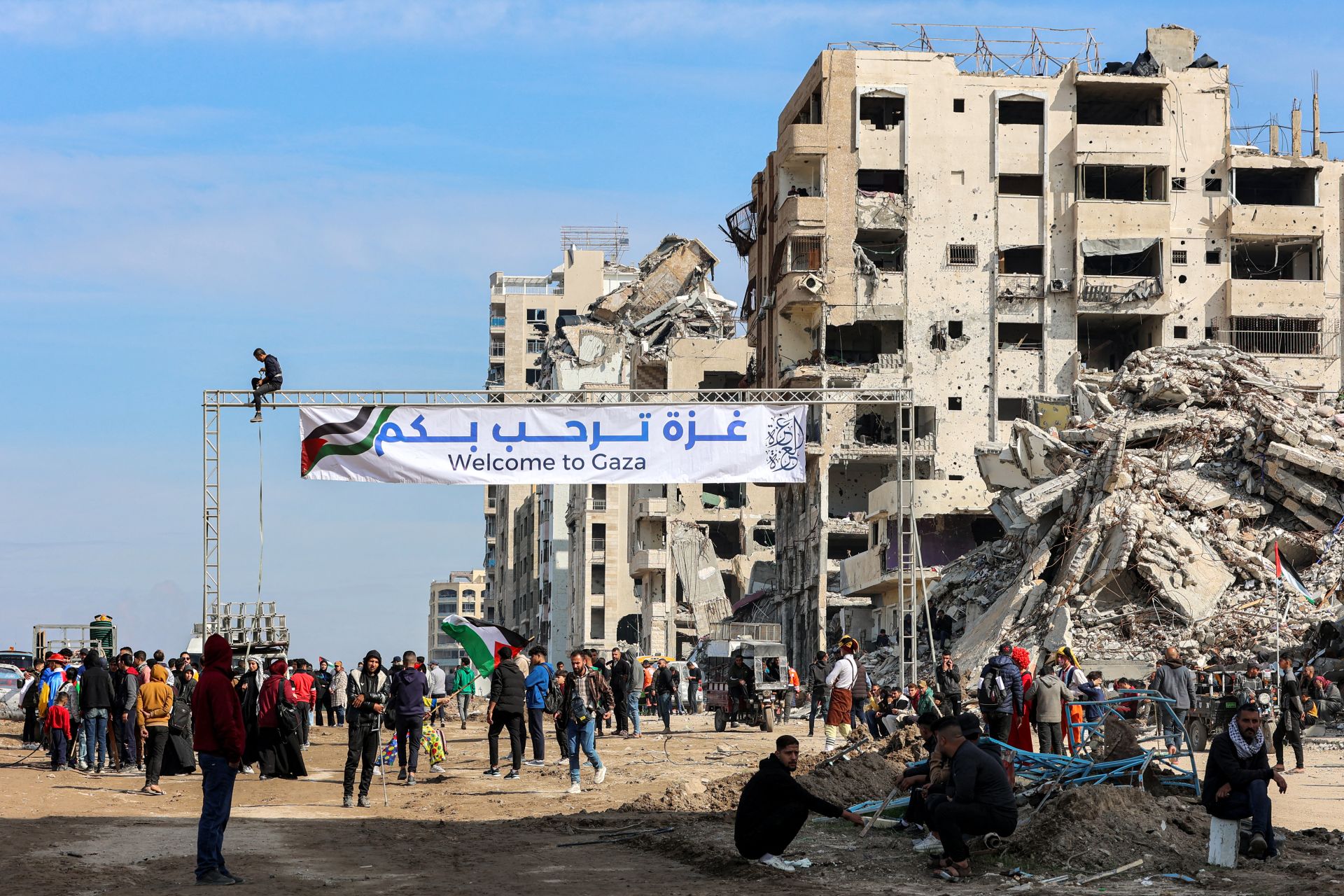- Home
- Middle East
- Palestinians Denounce Trump's Idea Of Displacing Gazans

©Omar Al-Qattaa
Both Hamas and Palestinian President Mahmoud Abbas on Sunday criticised Donald Trump's proposal to move the inhabitants of Gaza to Egypt and Jordan in order, in his words, to ‘clean house’ in the territory, where a fragile truce has entered its second week.
Israel and Hamas accused each other on Sunday of violating the terms of the ceasefire, the day after the Islamist movement exchanged four Israeli soldiers for around 200 Palestinian prisoners held in Israeli jails.
Meanwhile, ‘tens of thousands’ of displaced persons, according to the Civil Defence, were prevented by Israel from returning to northern Gaza via the Netzarim crossing, which cuts the territory in two. Images filmed by AFP showed a compact crowd on the outskirts of this corridor.
This situation, linked to a dispute over the release of an Israeli hostage, was in the process of being resolved on Sunday, according to a Palestinian source.
‘We want our memories and our loved ones back’, Jihad Abu Miri, who said he had been waiting for 48 hours, told AFP.
Against this backdrop, the US President on Saturday compared the devastated Palestinian territory to a ‘demolition site’.
‘We're talking about 1.5 million people, and we're just cleaning house in there,’ Trump said, suggesting a “temporary or long-term” move. ‘I'd like Egypt to take people in. And I'd like Jordan to take people in,’ he added.
The vast majority of the Gaza Strip's 2.4 million inhabitants have been displaced by the war within the besieged territory.
For the Palestinians, any attempt to move outside their territory evokes memories of the ‘Nakba’, or ‘Catastrophe’ in Arabic, the name given to the mass displacement that followed the creation of Israel in 1948.
‘We are telling Trump and the whole world that we will not leave Palestine or Gaza, no matter what happens,’ Rashad al-Naji, a displaced person from Gaza City, told AFP.
The Palestinians ‘will defeat’ Mr Trump's proposal ‘just as they have defeated all displacement projects (...) for decades’, Bassem Naïm, a member of the Hamas political bureau, reacted on Sunday.
Islamic Jihad, another armed Palestinian movement, said the comments encouraged ‘war crimes and crimes against humanity’ in Gaza.
Rival of Hamas, which ousted the Palestinian Authority and took power in Gaza in 2007, Mahmoud Abbas condemned ‘any project’ aimed at displacing Gazans.
Jordan, which hosts around 2.3 million Palestinian refugees, and Egypt both reaffirmed on Sunday their rejection of any ‘forced displacement’ of Palestinians.
The Arab League warned against ‘attempts to uproot Palestinians from their land’, which ‘could only be described as ethnic cleansing’.
Far-right Israeli minister Bezalel Smotrich described Donald Trump's proposal as an ‘excellent idea’, saying that the Palestinians could ‘establish a new and beautiful life elsewhere’.
The first phase of the ceasefire agreement reached after 15 months of war is due to last six weeks and will see the release of a total of 33 hostages held in Gaza, against some 1,900 Palestinian prisoners.
The first three hostages released on 19 January, the first day of the truce, in exchange for 90 Palestinian prisoners, were discharged from hospital on Sunday.
During this first phase, the terms of the second phase will be negotiated, which should lead to the release of the last hostages and the definitive end of the war, before the final stage involving the reconstruction of Gaza and the return of the bodies of the hostages who died in captivity.
The war was triggered by the Hamas attack on Israel on 7 October 2023, which resulted in the deaths of 1,210 people on the Israeli side, most of them civilians, according to an AFP count based on official Israeli data.
Of the 251 people kidnapped in the attack, 87 are still hostages in Gaza, 34 of whom the army says are dead.
The offensive launched in retaliation by Israel in the Gaza Strip has claimed at least 47,306 lives, the majority of them civilians, according to data from the Hamas government's Ministry of Health, which the UN considers reliable.
On Saturday, a last-minute dispute blocked the start of the return to the north of the Palestinian territory of hundreds of thousands of displaced persons, as provided for in the truce agreement.
On Sunday, Israel justified its refusal to let them through by accusing Hamas of two violations of the agreement.
Arbel Yehud, a civilian whose release Israel demanded on Saturday, ‘has not been released’ and ‘the list of the status’ of hostages - dead or alive - ‘has not been submitted’ by the Palestinian movement, according to Prime Minister Benjamin Netanyahu's office.
Hamas, for its part, accused Israel on Sunday of ‘violating’ the agreement by preventing the return of the inhabitants of northern Gaza.
However, two Palestinian sources said that the hostage should return home within the week in exchange for the release of 30 Palestinian prisoners, before the next exchange scheduled for 1 February. According to one of these sources, ‘the crisis’ has now been ‘resolved’.
In Israel, relatives of hostages kidnapped on 7 October 2023 but not on the list of those to be released as a priority told AFP of their anger on Sunday.
‘We want the agreement to continue and for them to bring the children back as quickly as possible and all at once,’ said Dani Miran, a 79-year-old man whose son Omri is a hostage in Gaza.
With AFP.
Read more



Comments